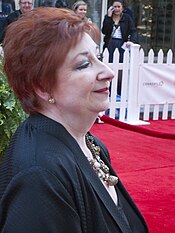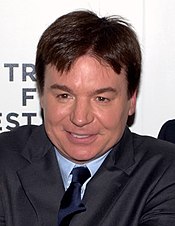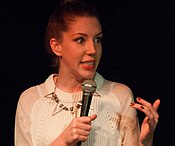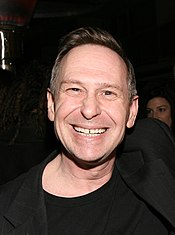List of Canadian comedians

Canadian comedians have been recognized internationally since the 1910s[a][1] and were embraced as the country sought a national identity distinct from that of Great Britain and the United States.[2] Canadians closely identify with their sense of humour, and working-class Canadians popularly consider comedians, along with singers and musical acts, as the country's cultural best.[3] Canadians are known to value modesty, politeness and social responsibility, and comedians who develop their craft before such audiences become acutely aware of the fine lines of comedy.
Overview[]
Types of humour[]
Many Canadian comedians have been influenced by American and British culture and humour. They blend the comic traditions of these cultures with Canadian humour while maintaining an outsider perspective, the latter providing a separation or ironic distance which has allowed for keen observational humour, impressions and parody.[4][5]:201–204 Comedy critics have described this as absorbing and adapting a dominant culture.[6]
Dark and fatalistic humour is also used extensively by Canadian comedians. This is generally attributed to the common reference point of the Canadian climate, the dangers of which are well known to comedians who tour the vast and often sparsely populated country.[5]:252–254 It may be impossible to change one's fate in the face of overwhelming forces, but the comedian allows the audience to use laughter as a coping mechanism.[7][5]:252–254
Social pressures[]

Domestic audiences traditionally value the collective good over individual freedom of expression, and as a consequence also value politeness and modesty. To overcome the taboo against social criticism, some Canadian comedians will link comedic discontent to group survival. Others will use a character or persona as a comedic mask, a tool which has allowed satire to gain mainstream popularity.[8][5]:25 Comedic characters with broad appeal are typically low-status, non-threatening, and likeable despite their misbehaviour.[6][7]
While social pressures cause Canadians to repress their fears and anxieties, comedians expose such through comedic art. Individual audience members externalize their reaction as laughter, publicly displaying their value system. When an audience laughs together it creates consensus at sharing a common worldview. Canadian comedians thus learn to be surrogates, using individual expression to reaffirm the collective while voicing and soothing the audience's troubles.[5]:258
Industry[]
Due to limited opportunities in Canada's entertainment industry, most comedians struggle to earn a living. Those who persevere have tended to place importance on artistic freedom, and are more likely to maintain creative control of their work.[5]:223 Some Canadian comedians move to the larger and more lucrative market of the United States, where they are perceived as "seasoned newcomers", having spent years developing their craft outside the notice of Hollywood.[2][9]
Since 2000, Canadian comedians have been recognized by the Canadian Comedy Awards (CCA), which has bestowed over 350 awards for comedy in live performances, film, television, radio, and Internet media.[10] Television comedy has also been recognized by the Canadian Screen Awards.
Film and broadcast performers are represented by the Alliance of Canadian Cinema, Television and Radio Artists (ACTRA), theatre performers by the Canadian Actors' Equity Association (CAEA), comedy writers by the Writers Guild of Canada (WGC), and stand-up comedians by the Canadian Association of Stand-up Comedians (CASC).[11][12]
List[]
Notable Canadian comedians include:[13][14]
A[]
- Roger Abbott
- Raymond Ablack
- Aaron Abrams
- David Acer
- Marty Adams
- Matt Alaeddine
- Todd Allen
- Aba Amuquandoh
- Trey Anthony
- Nicole Arbour
- Will Arnett
- Lauren Ash
- Brandon Ash-Mohammed
- Dan Aykroyd
- Peter Aykroyd
- Yank Azman
B[]

- Ali Badshah
- Ian Bagg
- Bob Bainborough
- Rupan Bal
- Boyd Banks
- John Barbour
- Irwin Barker
- Alexandre Barrette
- Michel Barrette
- Jay Baruchel
- Eric Bauza
- Jennifer Baxter
- Samantha Bee
- Tracey Bell
- Ryan Belleville
- Paul Bellini
- Carolyn Bennett
- Vincent Bilodeau
- Ben Blue
- Joe Bodolai
- Ian Boothby
- Trevor Boris
- Pierre Brassard
- David Andrew Brent
- Mark Breslin
- Dave Broadfoot
- Lois Bromfield
- Valri Bromfield
- Martin Bronstein
- Claire Brosseau
- Aisha Brown
- Aurora Browne
- Kyle Brownrigg
- Sophie Buddle
- Mike Bullard
- Pat Bullard
- Howard Busgang
- Ernie Butler
- Brent Butt
C[]

- Inga Cadranel
- Craig Campbell
- Tommy Campbell
- John Candy
- Bill Carr
- Jim Carrey
- Maggie Cassella
- John Catucci
- Michael Cera
- Paul Chato
- Martha Chaves
- Boris Cherniak
- Jonas Chernick
- Tommy Chong
- Michel Choquette
- Vince Matthew Chung
- Carla Collins
- Penelope Corrin
- Michel Courtemanche
- Susan Coyne
- Gavin Crawford
- Stéphane Crête
- Mark Critch
- Jonathan Crombie
- Neil Crone
- Steven Crowder
- Katie Crown
- Peter Cullen
- Seán Cullen
- James Cunningham
D[]

- Roman Danylo
- Tracy Dawson
- Ivan Decker
- Dashan, born Mark Rowswell
- Gerry Dee
- Jason Deline
- Eddie Della Siepe
- Charles Demers
- D.J. Demers
- Darrell Dennis
- Yvon Deschamps
- Chris Diamantopoulos
- J.R. Digs
- Debra DiGiovanni
- Dini Dimakos
- Melissa DiMarco
- David Dineen-Porter
- Jon Dore
- Harry Doupe
- Nigel Downer
- Jo-Anna Downey
- André Ducharme
- Rick Ducommun
- Jack Duffy
- Robin Duke
E[]
- Sam Easton
- Derek Edwards
- Ophira Eisenberg
- Laurie Elliott
- Lorne Elliott
- Anke Engelke
- Ennis Esmer
- Fred Ewanuick
F[]
- Anthony Q. Farrell
- Mark Farrell
- Marypat Farrell
- Scott Faulconbridge
- Don Ferguson
- Nathan Fielder
- Jebb Fink
- Chris Finn
- Joe Flaherty
- Dave Foley
- Mark Forward
- Heidi Foss
- Michael J. Fox
- Kevin Foxx
- Stewart Francis
- Matt Frewer
- Ajay Fry

G[]
- André-Philippe Gagnon
- Mayce Galoni
- Holly Gauthier-Frankel
- Kevin Gillese
- Nadia Giosia
- Stephen Kramer Glickman
- Shirley Gnome
- Amy Goodmurphy
- Luba Goy
- Janet van de Graaf
- Todd Graham
- Brooks Gray
- David Granirer
- Deven Green
- Rick Green
- Tom Green
- Kathy Greenwood
- Adam Growe
H[]
- Kristeen von Hagen
- Dean Haglund
- Geri Hall
- Barbara Hamilton[5]:26
- Allana Harkin
- Don Harron
- Jonny Harris
- Phil Hartman
- Ellie Harvie
- Ali Hassan
- John Hemphill
- Ed Hill
- Matt Hill
- Karen Hines
- Norm Hiscock
- Jessica Holmes
- Jeremy Hotz
- Kenny Hotz
- Louis-José Houde
- Patrick Huard
- Bruce Hunter
- Emma Hunter

I[]
- Jennifer Irwin
- Steve Ivings
J[]
- Sabrina Jalees
- Ron James
- Becky Johnson
- Andy Jones
- Cathy Jones
- Daryn Jones
- Jason Jones
- Jenny Jones
- Rick Jones
- Ron Josol
K[]
- Anthony Kavanagh
- Edward Kay
- Graham Kay
- Peter Kelamis
- Susan Kent
- Steven Joel Kerzner, creator of Ed the Sock
- Deborah Kimmett
- Simon King
- Paul Kligman
- Rebecca Kohler
- Elvira Kurt
L[]

- Kris LaBelle
- Jon Lajoie
- Jeremy Lalonde
- Maurice LaMarche
- Lisa Lambert
- Mado Lamotte
- Laura Landauer
- Bruno Landry
- Murray Langston, a.k.a. The Unknown Comic
- Jean Lapointe
- Gilles Latulippe
- Michel Lauzière
- Craig Lauzon
- Tony Law
- Chas Lawther
- Patrick Ledwell
- Paul Sun-Hyung Lee
- Claude Legault
- Julie Lemieux
- Sylvia Lennick
- Gaston Leroux
- Guy A. Lepage
- Dan Lett
- Dan Levy
- Eugene Levy
- Natalie Lisinska
- Mark Little
- Rich Little
- Gilson Lubin
- Marla Lukofsky
- Doris Lussier
M[]

- Bette MacDonald
- Mike MacDonald
- Norm Macdonald
- Shane MacDougall
- Cory Mack
- Meredith MacNeill
- Michael Magee[5]:23–33
- Bobby Mair
- Shaun Majumder
- Greg Malone
- Jay Malone
- Howie Mandel
- Dylan Mandlsohn
- Chanty Marostica
- Andrea Martin
- Bob Martin
- Mae Martin
- Paul Mather
- Amy Matysio
- Tim McAuliffe
- Peter McBain
- Trent McClellan
- Jordan McCloskey
- Kelly McCormack
- Bruce McCulloch
- Stuart McLean[citation needed]
- Drew McCreadie
- Kevin McDonald
- Wade McElwain
- Jeff McEnery
- Bonnie McFarlane
- Kathleen McGee
- Debra McGrath
- Terry McGurrin
- Don McKellar
- Patrick McKenna
- Duncan McKenzie
- Mark McKinney
- Ryan McMahon
- Wendel Meldrum
- Mark Meer
- Rick Mercer
- Claudine Mercier
- Jean-François Mercier
- Lisa Merchant
- Dave Merheje
- Darcy Michael
- Lorne Michaels
- Dominique Michel
- Gabrielle Miller
- Rick Miller
- Colin Mochrie
- Alice Moran
- Doug Morency
- Rick Moranis
- John Morgan
- Jordi Morgan
- Maynard Morrison
- Kirby Morrow
- James Mullinger
- Mike Myers
N[]
- Briane Nasimok
- Zarqa Nawaz
- Nick Nemeroff
- Phil Nichol
- Leslie Nielsen
- Rebecca Northan
- Alex Nussbaum
- Dave Nystrom
O[]
- Catherine O'Hara
- Paul O'Sullivan
- Peter Oldring
- Rose Ouellette
- Chris Owens
P[]

- Candy Palmater
- Laurent Paquin
- Ron Pardo
- Alan Park
- Pardis Parker
- Steve Patterson
- Teresa Pavlinek
- Nikki Payne
- Christina Pazsitzky
- Gary Pearson
- Ron Pederson
- Renee Percy
- Perry Perlmutar
- Matthew Perry
- François Pérusse
- Russell Peters
- Eric Peterson
- Martin Petit
- Andrew Phung
- Andrew Pifko
- Nestor Pistor
- Sarah Polley

R[]
- Rosemary Radcliffe
- Lara Rae
- Simon Rakoff
- Dan Redican
- Jus Reign
- Ryan Reynolds
- Nick Reynoldson
- Caroline Rhea
- Spencer Rice
- Edward Riche
- Jennifer Robertson
- Nancy Robertson
- Kenny Robinson
- Seth Rogen
- Darrin Rose
- Jamillah Ross
- Stéphane Rousseau
- Stéphane E. Roy
- Les Rubie
- Mag Ruffman
- Katherine Ryan
- Richard Ryder
S[]

- Ed Sahely
- Mort Sahl
- Josh Saltzman
- Sugar Sammy
- Jacob Samuel
- Jay Sankey
- Will Sasso
- Leo Scherman
- Ken Scott
- Derek Seguin
- Jeff Seymour
- Tommy Sexton
- Sandra Shamas
- Steven Shehori
- Martin Short
- Frank Shuster
- Kris Siddiqi
- Erica Sigurdson
- Arthur Simeon
- Tim Sims
- Lilly Singh
- Richard Z. Sirois
- Lee Smart
- DeAnne Smith
- Morag Smith
- Steve Smith
- Naomi Snieckus
- Snook
- Ron Sparks
- Winston Spear
- Tom Stade
- Tim Steeves
- David Steinberg
- Tabitha St. Germain
- Ryan Stiles
- Raymond Storey
- Janine Sutto

T[]
- Gordie Tapp
- Carolyn Taylor
- Alan Thicke
- Dave Thomas
- Greg Thomey
- Scott Thompson
- Pat Thornton
- Jacob Tierney
- Jackie Torrens
- Jonathan Torrens
- Angelo Tsarouchas
- Eric Tunney
V[]
- Billy Van
- Taz VanRassel
- Michael Venus
- Ron Vaudry
W[]
- Mary Walsh
- Dave Ward
- Mike Ward
- Morgan Waters
- Alan Watt
- Matt Watts
- Johnny Wayne
- Dave Weasel
- George Westerholm
- Jennifer Whalen
- Jason John Whitehead
- Peter Wildman
- Harland Williams
- Mike Wilmot
- Jonathan Wilson
- K. Trevor Wilson
- Mark Wilson
- John Wing, Jr.
- Glenn Wool
- Matt Wright
Y[]
- Scott Yaphe
- Alan Young
- Fraser Young
- Andrew Younghusband
Z[]
Duos[]
- Bowser and Blue
- Crampe en masse
- Double Exposure
- MacLean & MacLean
- Bob and Doug McKenzie
- Life of a Craphead
- Mump and Smoot
- The Ryan and Amy Show
- Smith & Smith
- The Sufferettes
- Wayne and Shuster
Troupes[]

- The Arrogant Worms
- The B-Girlz
- Baroness von Sketch Show
- The Chumps
- CODCO
- Die-Nasty
- The Frantics
- Hot Thespian Action
- IFHT
- The Kids in the Hall
- The Minnesota Wrecking Crew
- Mostly Water Theatre
- Picnicface
- Rapid Fire Theatre
- Rock et Belles Oreilles
- Royal Canadian Air Farce
- The Second City
- The Sketchersons
- TallBoyz
- Three Dead Trolls in a Baggie
- The Vestibules
- Women Fully Clothed
- Les Zapartistes
See also[]
Footnotes[]
Notes[]
References[]
- ^ Jump up to: a b Wilson, Jason (2012). Soldiers of Song: The Dumbells and other Canadian Concert Parties of the First World War. Waterloo, Ontario: Wilfrid Laurier University Press. ISBN 9781554588824.
- ^ Jump up to: a b Clark, Andrew (1 February 1999). "The land of laughs". Maclean's. Retrieved 2 August 2019.
- ^ Dunk, Thomas (2000). "National culture, political economy and socio-cultural anthropology in English Canada". Anthropologica. Waterloo, Ontario: Canadian Research Centre for Anthropology / Wilfrid Laurier University Press – via ProQuest (subscription required). 42 (2): 131. ISSN 0003-5459. ProQuest 214176847.
...working-class individuals [...] idea of Canada's cultural best is more likely to include the Canadian comedians who have frequented American television shows such as Saturday Night Live (Dan Aykroyd, Mike Myers) or rock groups such as Rush [...] or more recently internationally famous performers such as Shania Twain or Celine Dion.
- ^ "5 explanations from comedians about Canadians in Hollywood". Maclean's. The Canadian Press. 31 August 2014. Archived from the original on 2 October 2017. Retrieved 7 June 2019. Originally published in Maclean's Book of Lists, Volume 1 (2012)
- ^ Jump up to: a b c d e f g h Clark, Andrew (1997). Stand and Deliver: Inside Canadian Comedy. Toronto: Doubleday Canada Limited. ISBN 0-385-25602-7.
- ^ Jump up to: a b Cohen, Robert (2015). Being Canadian. Amaze Film + Television.
- ^ Jump up to: a b "Humourous Canadensis: A scientifically-proven look at Canuk". Performing Arts & Entertainment in Canada. Toronto, Ontario: Avanti Magazines – via ProQuest (subscription required). 28 (4): 6–9. 1994. ISSN 1185-3433. ProQuest 224867508.
As with print before it, the advent of radio and television brought closer contact between Canada's disparate regions. With this contact – through a sort of broadcast-based nation building – came the 'need' to find unifying cultural icons. As we explored the ties that bound us, we found the one image we could all identify with: The Hoser.
- ^ Gopnik, Adam (18 May 2019). "Canada is the model liberal nation – and Canadians should embrace that". The Globe and Mail. Toronto, Ontario: The Globe and Mail Inc. Archived from the original on 25 May 2019. Retrieved 23 June 2019.
Those Canadian habits of modesty, with its assumed mockery of pretension, are one of the reasons for the primacy of Canadian comedians in American humour.
- ^ Lai, Shirley (1995). "So you want to be a comedian, eh?". Performing Arts & Entertainment in Canada. Toronto, Ontario: Avanti magazines – via ProQuest (subscription required). 30 (1): 17–19. ISSN 1185-3433. ProQuest 224867967.
Canada has turned out some of the funniest people on the planet.
- ^ "Nominations & Awards Archives | Canadian Comedy Awards". Canadian Comedy Awards. Toronto, Ontario. 2019. Archived from the original on 6 May 2019. Retrieved 30 May 2019.
- ^ Hannay, Chris (23 November 2018). "Beating them to the punchline: How Canadian stand-ups are trying to change the funny business". The Globe and Mail. Toronto: The Globe and Mail Inc. Archived from the original on 4 March 2019. Retrieved 10 April 2019.
- ^ Mudhar, Raju (7 March 2018). "Standup comedians take a crack at government funding". The Toronto Star. Toronto Star Newspapers Limited. Archived from the original on 2 December 2018. Retrieved 10 April 2019.
- ^ Maurice Charney (August 2005). Comedy: a geographic and historical guide. Greenwood Publishing Group. pp. 210–213. ISBN 978-0-313-32714-8. Archived from the original on 2016-09-03. Retrieved 2016-10-22.
- ^ "Canadian Comedians Direct". Archived from the original on 2013-01-28. Retrieved 2013-07-01.
- Lists of Canadian people by occupation
- Lists of comedians
- Canadian comedians